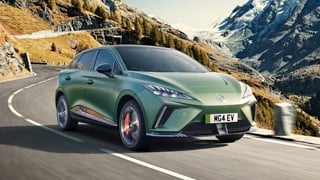The Government’s new electric car grant poses a significant residual value (RV) risks for rental industry and short-cycle fleet operators, new research suggests.
The analysis of the UK Government's new £650 million electric vehicle (EV) fund, published by Indicata, identifies significant differences in how the grant will affect vehicle RVs based on age segments.
Younger vehicles, under 12 months, will experience notable downward pressure on used prices, with approximately 90% of new vehicle price changes flowing through to the used market.
Conversely, vehicles aged three years or more will see minimal impact due to weaker correlation between new and used vehicle pricing, it says.
“The rental industry and short-cycle fleet operators face particular exposure to these dynamics,” said Andy Shields, Indicata’s global business unit director.
“Those purchasing non-subsidised vehicles risk significant losses if those models subsequently gain subsidy eligibility, as the market will adjust residual values downward to reflect the reduced new vehicle transaction prices.”
The Government’s new electric car grant will be worth up to £3,750 off a new battery electric vehicle (BEV).
To qualify, electric cars must have a recommended retail price (RRP) of £37,000 or less, with two levels of grant available depending on the carmaker’s sustainability standards.
The ‘greenest’ vehicles in band one will receive up to £3,750, with band two vehicles receiving up to £1,500.
Eligibility for the funding requires manufacturers to have committed to a verified science-based target (SBT) and have embodied carbon scores below a certain threshold.
Vehicles made by manufacturers who have not set an SBT will not be eligible for the scheme, says the DfT.
The SMMT expects around one third of electric cars on the market to qualify for the grant based on the criteria set out by Government.
However, battery electric vehicles (BEVs) made in South Korea and China are likely to miss out on the grant based on their environmental standards.
Several OEMs have subsequently announced their own money-off deals, including Hyundai, MG and Leapmotor, with Skywell UK and Volvo the latest to launch their own EV incentives in response to the delays and uncertainty faced by customers.
Shields explained: “The programme will essentially brand BEV cars as ‘environmental’ versus ‘non-environmental’ despite all being zero emissions.
“Consumer behaviour will likely shift toward subsidised models, creating competitive dynamics that may reshape market positioning regardless of the limited financial scale.”
Indicata’s analysis warns that while long-cycle fleets face minimal downside and may benefit from reduced transaction prices, short-cycle operators must carefully navigate timing risks.
The report recommends that fleet operators prioritise subsidised vehicle purchases while avoiding non-subsidised vehicles with potential future subsidy eligibility.
Drawing parallels with the Tesla price reduction programme of Q1 2023, the analysis suggests that significant pricing interventions by major market players create market-wide effects rather than model-specific impacts, potentially extending the grant program's influence beyond directly subsidised vehicles.
Market transformation ‘not expected’ from £650m electric car grant

Indicata's analysis reveals that the grant will support only approximately 5.8% to 14.4% of annual BEV sales, depending on the tier of support accessed.
With the zero emission vehicle (ZEV) mandate requiring a greater BEV new market share each year, the grant’s reach appears modest against the scale of market transformation required, says Indicata.
“The reality is that this programme, while well-intentioned, will function more as targeted support for specific market segments rather than a broad market transformation tool that many were expecting,” said Shields.
"When we look at the Italian precedent, where similar support levels failed to materially impact BEV registration rates, we have to question whether this £650m investment will deliver the market change theGgovernment is seeking.”
The Italian Government supported BEVs in Italy with an annual budget of €240m (£208m) with support up to €5,000 per unit (£4,350). This is an equivalent level of support, yet Italian BEV registrations remained at circa 4.2%.




























Login to comment
Comments
No comments have been made yet.